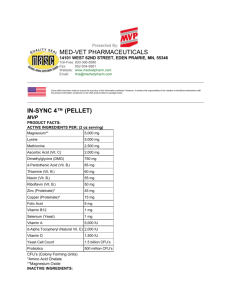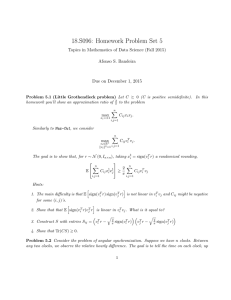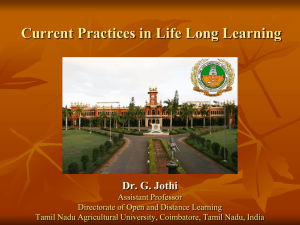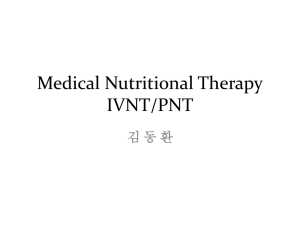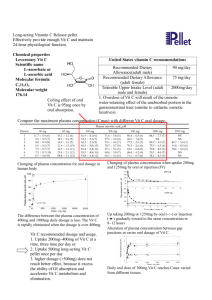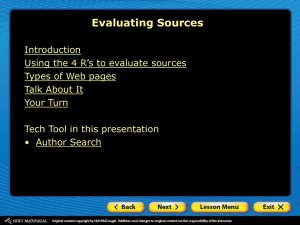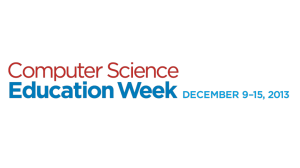VIT Ahmedabad Presentation ()
advertisement
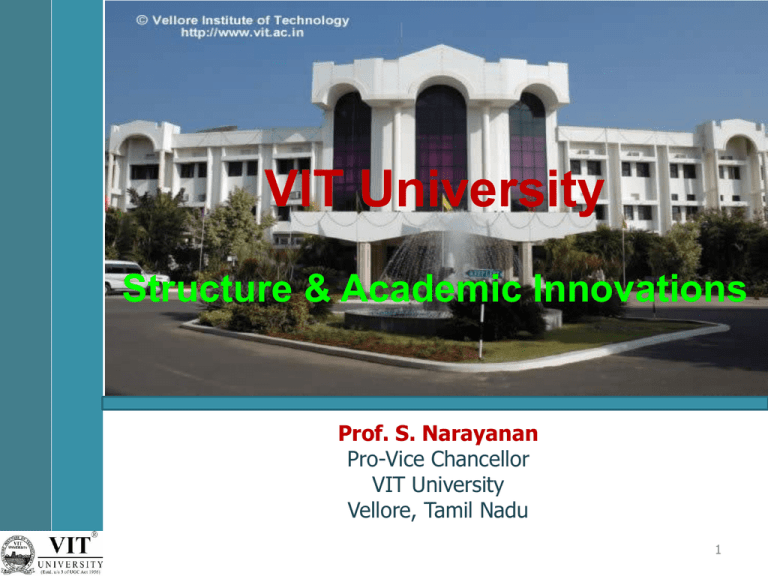
VIT University Structure & Academic Innovations Prof. S. Narayanan Pro-Vice Chancellor VIT University Vellore, Tamil Nadu 1 Agenda • Brief History • Academic Innovations – FFCS • • • • • • • • Unique Academic Features Focus on Research Industry Collaborations International Relations Academic Staff College University Social Responsibility Staff Welfare Awards 2 VIT – A brief history 1984 – Vellore Engineering College with 3 Undergraduate programmes with 180 students and 15 faculty members 1995 – Blossomed into Postgraduate institution 2001 – Conferred Deemed University Status – renamed as Vellore Institute of Technology 2006 – Renamed as VIT University (u/s 3 of UGC Act) 2013 - 22000+ Students 1200+ Faculty 18 UG/ 32 PG/ MS/ Ph.D 3 Administrative Structure Chancellor Vice - Chancellor Pro -Vice Chancellor Deans Directors Division Chairs Faculty Faculty Staff Staff 4 Schools • School of Bio Sciences and Technology (SBST) • School of Computer Science & Engineering (SCSE) • School of Information Technology & Engineering (SITE) • School of Electrical Engineering (SELECT) • School of Electronics Engineering (SENSE) • School of Mechanical & Building Sciences (SMBS) • School of Social Sciences & Languages (SSL) • School of Advanced Sciences (SAS) • VIT Business School (VITBS) 5 Accreditations ISO Certification NBA Accreditated NAAC – Reaccreditated with A ABET (Accreditation Board for Engineering and Technology) - B.Tech. Mechanical Engineering (EAC)* - B.Tech. Civil Engineering (EAC)* - B.Tech. Electronics and Communication Engineering (EAC)* - B.Tech. –Comp.Science (EAC* and CAC**) * EAC – Engineering Accreditation Commission ** CAC – Computing Accreditation Commission 6 Academic Innovations Fully Flexible Credit System (FFCS) – from 2008 - 09 Students can choose • Number of credits • Instructor • Time table • Courses • Which semester the course can be studied It allows slow and advanced learners to choose courses according to their abilities Optional Summer Semester B.Tech. curriculum focuses on the following disciplines: Basic Sciences, Humanities, Management and Professional Engineering Institution provides core and elective options both at University and School level enabling interdisciplinary mobility 7 Other features of FFCS Registration – Web based Add or drop of registered courses to balance workload Course withdrawal to maximize grades Course Auditing to gain additional knowledge Registering M.Tech. level courses for in-depth experience Course Substitution option Grade Improvement Credit Transfer for course migration 8/82 8 Unique Academic Features One foreign language course is compulsory for all B.Tech. students 2 credit course – Co and Extra curricular Bridge courses are offered as per requirement Internship/Industrial training is compulsory for all B.Tech. students Bright UG students are permitted to undergo to select PG courses as their electives Slot based time tabling helps a student to make his/her own time table to balance optimum curricular and co-curricular activities Student feedback is obtained using OMR forms or online Smart classrooms available Student Assisted Learning 9 Unique Academic Features (Contd.) Major / Minor / Dual Major Faculty Empowerment Project Based Learning Research Based Learning Innovation Lab – MIT – USA Revision & Curriculum – Industry needs Grading Hybrid Relative Absolute 10 Focus on Research Scopus indexed publications Research Based Learning Patents Research Centres Research Projects URDC / SRDC / Code of Academic & Research Ethics help in streamlining the research activities 11 Industry Collaborations ARAI, Pune Microsoft CISCO IBM Schneider Accenture Cummins 12 12 International Relations MoUs signed with over 100 universities around the world Presently, around 1100 international students countries are undergoing various courses on campus representing 45 More than 100 foreign students have undergone internships More than 500 eminent scholars from abroad have visited and offered credit courses VIT students are encouraged to carry out Masters, Doctoral as well as their final semester project work outside the country (SAP) Students and faculty are supported financially to participate at international academic and technical meets Established Bio-separation Centre University of Compiegne, France supported by DST and Introduced a Bachelors’ programme in Mechanical and Energy Engineering designed in consultation with UAS Aachen, TU, Eindhoven 13/82 13 and IIT Madras under Asia- Link programme and EU Academic Staff College Established in 2003 Headed by a full-time Director with a faculty strength of 6 Types of programmes – Induction Programmes – Subject Updating Programmes – English Proficiency Programmes – Soft Skills Programmes – Technology Enabled Learning Programmes Serves primarily internal faculty members Periodically organizes for external participants also 14 University Social Responsibility STARS CSRD Higher Education for all Y-Spark Skill Development GV School Development Health Camps and Awareness Camps 15 Staff Welfare Performance Incentive (PI) scheme: 100 points = one month salary Implemented VI pay commission recommendations from January 2009 LIC pension plan Mediclaim Medical Insurance and free Health Centre service Employee provident fund and Gratuity Staff quarters Establishing VIT Nagar – plot for VIT faculty and staff Admission and fee concession to faculty / staff children at VIT 16 Awards Record Placement – Limca Book of Records Assocham VIT Award Technology Business Incubator (TBI) adjudged the best TBI for the year 2008 by DST TVN-KIDAO-NIQR Award by the National Institute of Quality and Reliability [NIQR] of CII for maintaining exceptional quality EXNORA Green Campus Award by EXNORA International for maintaining the campus clean and green The Entrepreneur Award by ICICI Venture, CII Connect 2006 – creating suitable infrastructure and facilities for imparting IT education in the country 17 Thank you 18

